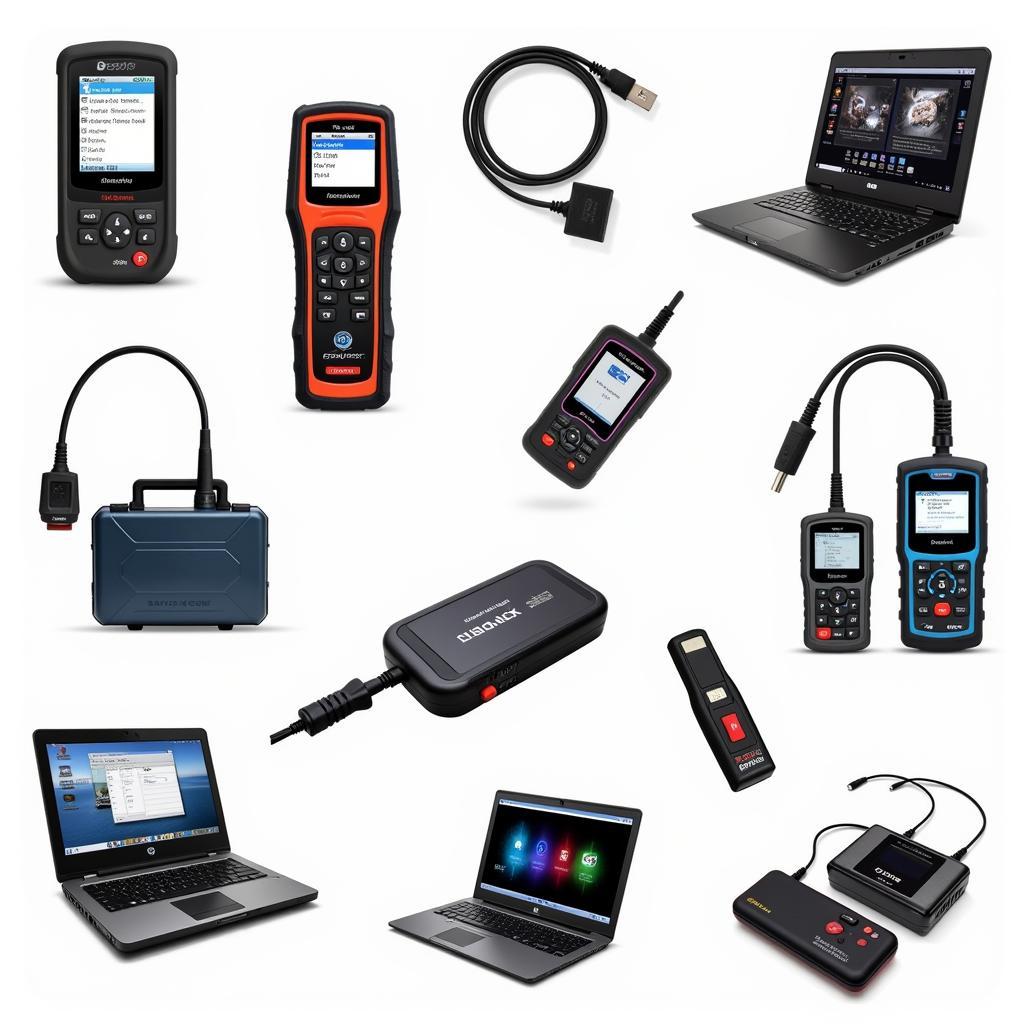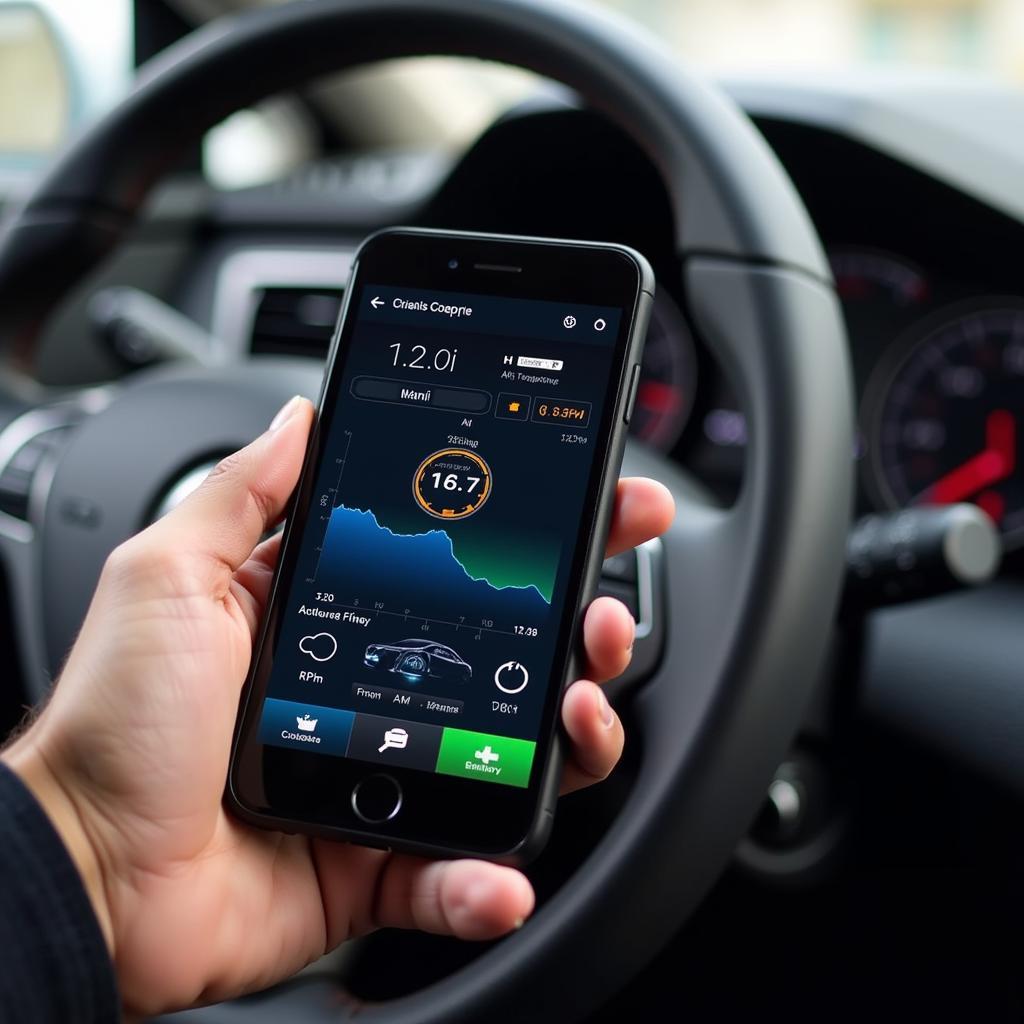The Diagnostic Plug Car, more commonly known as the OBD-II port, is a standardized 16-pin connector found in most vehicles manufactured after 1996. This inconspicuous port, often located under the dashboard on the driver’s side, serves as a direct line of communication to your car’s computer system, providing a wealth of information about its health and performance.
Unlocking the Secrets Within Your Car’s Computer
Similar to how a doctor uses medical instruments to diagnose human health, mechanics and car enthusiasts alike rely on the diagnostic plug car to understand a vehicle’s inner workings. By connecting a specialized tool or device, known as a car diagnostic scanner, to the OBD-II port, you gain access to a treasure trove of data generated by the various sensors and modules within your vehicle.
This data can reveal a wide range of information, from simple details like engine RPM and coolant temperature to more complex diagnostics such as:
- Reading and clearing diagnostic trouble codes (DTCs): When the check engine light illuminates on your dashboard, it’s often accompanied by a DTC stored in the vehicle’s computer. These codes act as indicators of specific issues detected by the car’s sensors.
- Monitoring real-time sensor data: Want to know your fuel economy, oxygen sensor readings, or transmission fluid temperature? The diagnostic plug car grants access to this data and more, enabling you to monitor your vehicle’s performance in real time.
- Performing advanced diagnostics and troubleshooting: For experienced mechanics and DIY enthusiasts, the OBD-II port offers the ability to conduct component activations, system resets, and other advanced procedures for in-depth troubleshooting.
Choosing the Right Diagnostic Tool for Your Needs
The market offers a vast array of car diagnostic tools catering to different needs and budgets. These range from basic code readers that simply display DTCs to professional-grade scanners with advanced functionalities like live data graphing, ECU programming, and bi-directional control.
 Different Types of Car Diagnostic Tools
Different Types of Car Diagnostic Tools
When choosing a diagnostic plug car tool, consider your technical expertise, budget, and intended use. If you’re a casual car owner primarily interested in checking and clearing engine codes, a basic code reader might suffice. However, for more in-depth diagnostics and troubleshooting, a more sophisticated scanner with advanced features would be a worthwhile investment.
The Future of Diagnostics: Plug In Car Diagnostic Phone Apps
The evolution of technology has extended the reach of car diagnostics to the palm of your hand. With the advent of plug-in car diagnostic phone apps, you can now transform your smartphone or tablet into a powerful diagnostic tool.
These apps, often paired with a Bluetooth-enabled OBD-II adapter that plugs into the diagnostic port, provide a user-friendly interface for accessing and interpreting vehicle data. They offer features like:
- Real-time dashboard displays: Visualize essential vehicle parameters like speed, RPM, coolant temperature, and fuel economy in an intuitive dashboard format.
- DTC reading and clearing: Easily access and clear DTCs stored in your car’s computer, often accompanied by detailed code definitions and potential solutions.
- Performance monitoring and trip logging: Track your driving habits, fuel efficiency, and other performance metrics. Some apps even offer trip logging functionalities for expense tracking.
 Smartphone Displaying Car Diagnostic Information
Smartphone Displaying Car Diagnostic Information
Empowering Car Owners and Mechanics Alike
The diagnostic plug car has revolutionized the way we interact with our vehicles. It empowers car owners to take a proactive approach towards maintenance, understand potential issues, and make informed decisions about repairs. For mechanics, it provides an indispensable tool for efficient and accurate diagnostics, leading to quicker repairs and satisfied customers.
In a world of increasingly complex vehicles, the diagnostic plug car serves as a vital bridge between man and machine, ensuring a smoother and more transparent automotive experience.
FAQs about Diagnostic Plug Cars
Q: Where can I find the diagnostic plug car in my vehicle?
A: The OBD-II port is typically located under the dashboard on the driver’s side. However, its exact location may vary depending on the make and model of your car.
Q: Can I use any diagnostic tool with my car?
A: While the OBD-II port is standardized, certain diagnostic tools may be specifically designed for certain car makes or models. It’s crucial to choose a tool compatible with your vehicle.
Q: Is it safe to use a diagnostic plug car tool?
A: Using a reputable diagnostic tool and following the manufacturer’s instructions is generally safe. However, avoid tampering with settings or performing procedures beyond your expertise.
Q: Can I fix my car myself using a diagnostic tool?
A: While a diagnostic tool can help identify potential issues, it’s essential to remember that car repair often requires specialized knowledge and tools. Consult a qualified mechanic for complex repairs.
Q: What should I do if my check engine light stays on after clearing the codes?
A: A persistent check engine light indicates an underlying issue that needs further investigation. It’s best to consult a mechanic to diagnose and address the problem.
Q: Are plug-in car diagnostic phone apps reliable?
A: While many plug-in car diagnostic apps offer valuable insights, their accuracy and functionality can vary. Choose apps from reputable developers with positive user reviews.
Q: Can a diagnostic plug car drain my car battery?
A: Leaving a diagnostic tool plugged in for extended periods while the engine is off can drain your car battery. Always disconnect the tool after use.
Need further assistance with your car’s diagnostics?
Contact our team of experts via WhatsApp: +1(641)206-8880, Email: [email protected]. We provide 24/7 support and can assist with any questions or concerns you may have.

Leave a Reply